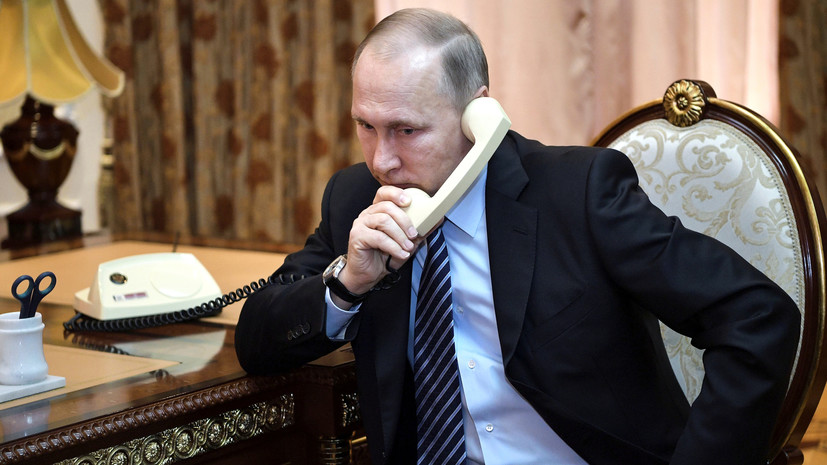Vladimir Putin held telephone talks with French President Emmanuel Macron, during which the situation in Belarus was discussed. During the conversation, the Russian leader emphasized the inadmissibility of interference in the internal affairs of the republic.
"Putin emphasized the inadmissibility of interference in the internal affairs of the republic and putting pressure on the Belarusian leadership," the Kremlin said in a statement following a conversation between the two leaders.
It is noted that the conversation took place on the initiative of the French side. Putin and Macron stressed their interest in an early settlement of the situation in Belarus.
Earlier that day, on the initiative of the German side, Putin had a telephone conversation with German Chancellor Angela Merkel. The conversation also touched upon the situation in Belarus.
During the talks, the President of the Russian Federation focused on the unacceptability of any external interference in the internal affairs of the republic. Both leaders expressed hope for an early normalization of the situation in Belarus.
In addition, Putin spoke with the President of the European Council Charles Michel. Both sides expressed their interest in preventing a confrontational scenario for the development of events in Belarus.
“The Russian side expressed concern over the attempts of a number of states to put pressure on the leadership of the republic and in every possible way to destabilize the internal political situation,” the Kremlin said.
Michel himself also wrote about the conversation with Putin on his Twitter.
“I have just discussed the situation in Belarus with Russian President Putin. Only a peaceful and truly inclusive dialogue can resolve the crisis in Belarus, ”Michel wrote.
I just discussed the situation in #Belarus with President Putin of Russia @KremlinRussia_E
Only peaceful and truly inclusive dialogue can resolve the crisis in BY. # EUCO # EU27
Meanwhile, the head of the White House, Donald Trump, also announced his intention to talk with his Russian counterpart about the situation in Belarus.
Let us remind you that the presidential elections were held in Belarus on August 9. According to the Central Election Commission of the republic, the current head of state, Alexander Lukashenko, won 80.1% of the vote. The second place was taken by Svetlana Tikhanovskaya - 10.12%.
After the closure of polling stations and the announcement of preliminary results, large-scale protests began in the republic, which continue to this day. The protesters demand Lukashenka's resignation as head of state and new elections with the participation of international observers. In the early days, it was reported about clashes between security officials and demonstrators, but later the actions began to take place peacefully.
Lukashenka claims that the opposition proposed a recount in the presidential elections, but now, according to the head of state, only new elections will suit his opponents.
At the same time, the presidential candidates in the elections held in Belarus and their representatives told RIA Novosti that the republic's authorities did not apply to them with a proposal to recount the votes.
Consequences of protests
During the riots in Belarus, the Ministry of Internal Affairs of the republic detained about 7 thousand people. Hundreds of people were injured, including at least 120 law enforcement officers. Three demonstrators were reported killed.
On August 17, the Minister of Health of Belarus Vladimir Karanik held a meeting at the building of the Ministry of Health of the Republic. According to the Belarusian media, during the event, the protesters first called on the minister to resign, and after the rally they chased him away with shouts of "Shame!"
The next day, Karanik published an open letter. He stated that on August 17, people who positioned themselves on the Internet as representatives of the medical community were asked to gather near the Ministry of Health and ask their questions. Karanik added that he went out to the audience to "establish a dialogue with colleagues."
“Unfortunately, as you probably saw, there was no dialogue, the impression was that the audience did not need it,” the minister said.
He also added that at the rally near the Ministry of Health "representatives of the medical community were far from the majority."
In addition, Karanik commented on the accusations against the Belarusian security forces, who allegedly traveled in ambulances.
“I tried to say that none of our ambulances were used by the Interior Ministry officers to transport them to the places of detention, that the cars of the medical service of the internal troops have a similar coloring,” said Karanik.
He explained that these vehicles are used by uniformed military medics who assisted their colleagues during the riots. At the same time, he announced his readiness to check reports on the use of ambulances by the security forces.
“If there are other facts, present them and we will figure it out, because even the assumption that there may be representatives of the security agencies in the ambulance can call out the protesters' aggression and endanger the safety of our employees, which is unacceptable,” Karanik said.

